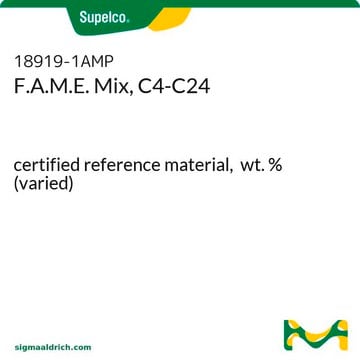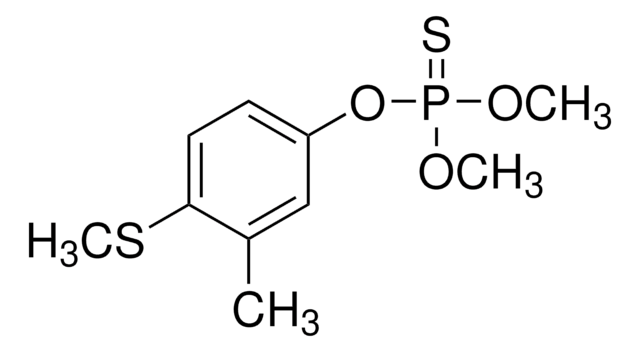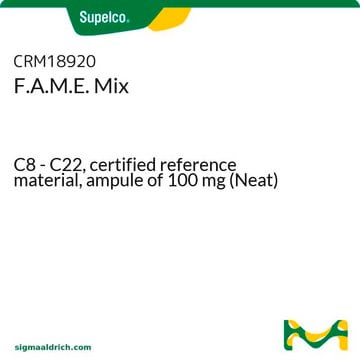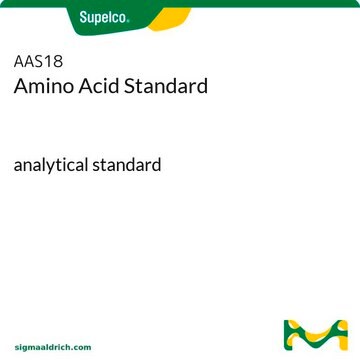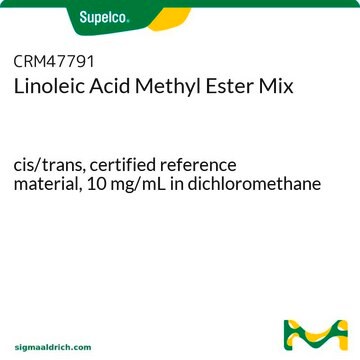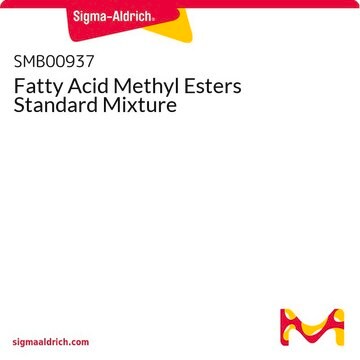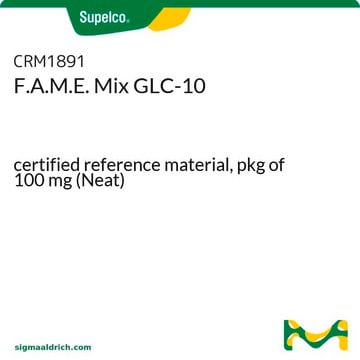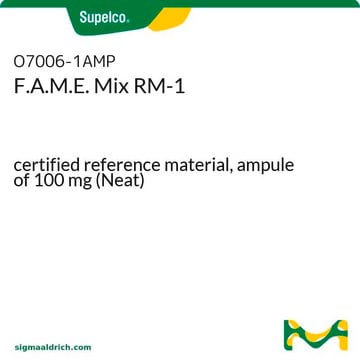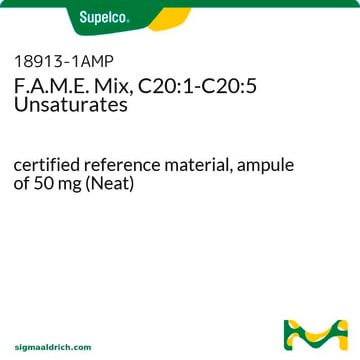CRM18918
F.A.M.E. Mix
C8 - C24, certified reference material, ampule of 100 mg (Neat)
Anmeldenzur Ansicht organisationsspezifischer und vertraglich vereinbarter Preise
Alle Fotos(1)
About This Item
UNSPSC-Code:
85151701
NACRES:
NA.24
Empfohlene Produkte
Qualität
certified reference material
TraceCERT®
Qualitätsniveau
Produktlinie
TraceCERT®
Analysenzertifikat (CofA)
current certificate can be downloaded
Verpackung
ampule of 100 mg (Neat)
Methode(n)
HPLC: suitable
gas chromatography (GC): suitable
Anwendung(en)
food and beverages
Format
mixture
Funktionelle Gruppe
carboxylic acid
ester
Versandbedingung
dry ice
Lagertemp.
-10 to -25°C
Allgemeine Beschreibung
This Certified Reference Material (CRM) is produced and certified in accordance with ISO 17034 and ISO/IEC 17025. All information regarding the use of this CRM can be found on the certificate of analysis.
Anwendung
The CRM has been used as follows:
- To determine the fatty acid content in the study to investigate the catalytic activity of Fe-exchanged montmorillonite K10 (Fe-MMT K10) in the conversion of waste cooking oil to biodiesel
- Assessment of fatty acids in the native microalgal species by gas chromatography-mass spectrometry (GC-MS) to evaluate their lipid content and biomass productivity
- Fatty acid profiling of oil extracted from grape seeds using GC-MS to study the effect of ultrasound technology on the three extraction methodologies based on low-pressure Soxhlet and Bligh Dyer, and high-pressure supercritical carbon dioxide-SFE
- To evaluate the fatty acid composition of the biodiesel obtained from the wastewater treatment high-rate algal pond (WWT HRAP) biomass using GC-FID
Sonstige Hinweise
Refer to the product′s Certificate of Analysis for more information on a suitable instrument technique. Contact Technical Service for further support.
Rechtliche Hinweise
TraceCERT is a registered trademark of Merck KGaA, Darmstadt, Germany
Analyt
Beschreibung
Methyl arachidate 8 wt. %
Methyl behenate 8 wt. %
Methyl decanoate 8 wt. %
Methyl cis-13-docosenoate 5 wt. %
Methyl dodecanoate 8 wt. %
Methyl linoleate
Methyl linolenate 5 wt. %
Methyl myristate 8 wt. %
Methyl octanoate 8 wt. %
Methyl oleate 5 wt. %
Methyl palmitate 11 wt. %
Methyl palmitoleate 5 wt. %
Methyl stearate 8 wt. %
Methyl tetracosanoate 8 wt. %
Alle anzeigen (14)
Ähnliches Produkt
Produkt-Nr.
Beschreibung
Preisangaben
Signalwort
Warning
H-Sätze
P-Sätze
Gefahreneinstufungen
Aquatic Acute 1 - Aquatic Chronic 3
Lagerklassenschlüssel
10 - Combustible liquids
WGK
WGK 3
Flammpunkt (°F)
Not applicable
Flammpunkt (°C)
Not applicable
Hier finden Sie alle aktuellen Versionen:
Besitzen Sie dieses Produkt bereits?
In der Dokumentenbibliothek finden Sie die Dokumentation zu den Produkten, die Sie kürzlich erworben haben.
Kunden haben sich ebenfalls angesehen
S Hackenschmidt et al.
FEMS yeast research, 19(7) (2019-10-13)
Despite the increasing relevance, ranging from academic research to industrial applications, only a limited number of non-conventional, oleaginous Yarrowia lipolytica strains are characterized in detail. Therefore, we analyzed three strains in regard to their metabolic and physiological properties, especially with
Yung-Yu Tsai et al.
Journal of bioscience and bioengineering, 127(4), 430-440 (2018-10-15)
The oil plants provide a sufficient source of renewable lipid production for alternative fuel and chemical supplies as an alternative to the depleting fossil source, but the environmental effect from these plants' cropping is a concern. The high oleic acid
Ayoma Witharana et al.
Environmental technology, 39(16), 2062-2072 (2017-07-01)
Fats, oils and grease (FOG) congregate in grease traps and are a slowly biodegradable particulate organic matter, which may require enzymatic or hydrolytic conversion to form readily biodegradable soluble organic matter. The existing treatment methods employ water-based hydrolysis of FOG
Maria Grazia Melilli et al.
Foods (Basel, Switzerland), 9(6) (2020-06-14)
The addition of functional ingredients to breads could have effects on preventing cardiovascular diseases, cancers and inflammation. The incorporation of 0-5-10-15% of three populations of dried purslane flour on the rheological, sensorial and nutritional quality of fortified durum wheat breads
Rosa Marchetti et al.
Applied microbiology and biotechnology, 103(19), 8267-8279 (2019-08-30)
Recycling of waste cooking oil greatly reduces the environmental impact of its disposal. As fats can give rise to high methane yields, the use of waste cooking oil for biogas production seems a promising solution. The aim of this work
Unser Team von Wissenschaftlern verfügt über Erfahrung in allen Forschungsbereichen einschließlich Life Science, Materialwissenschaften, chemischer Synthese, Chromatographie, Analytik und vielen mehr..
Setzen Sie sich mit dem technischen Dienst in Verbindung.
